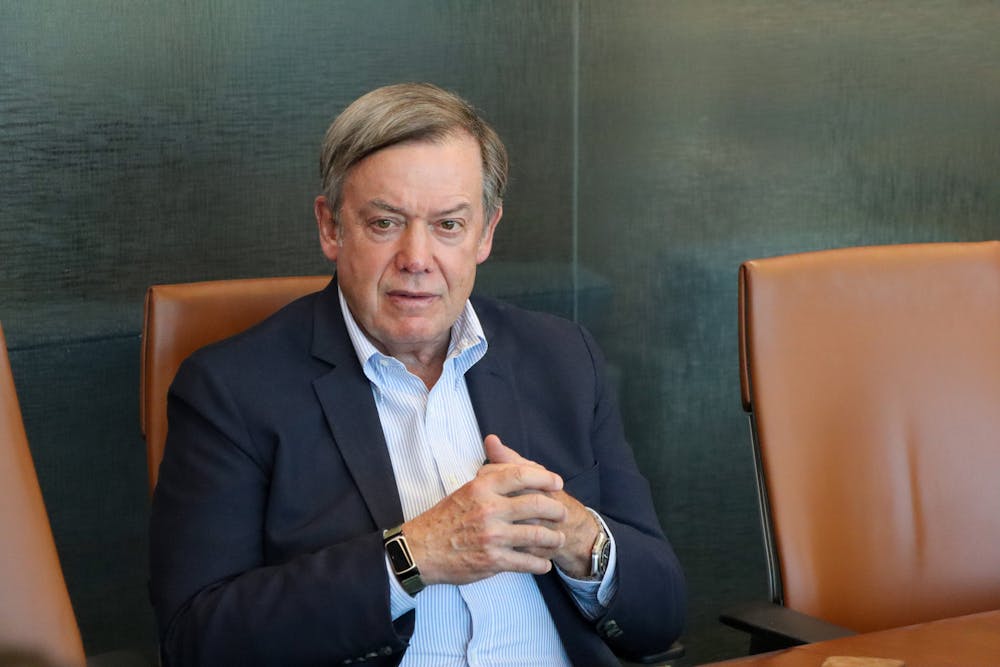In a meeting with The State Press on Oct. 25, ASU President Michael Crow spoke about campus security surrounding Election Day, a new partnership with the U.S. Department of Defense and ASU's role in water conservation, among other topics.
Free speech, post-election security on campus
With Election Day approaching, Crow was asked about how the University will handle free speech demonstrations on campus.
"You can protest. You can stand outside that building and have your flags and your banners and so forth. You can do all of that," Crow said. "But you can't interrupt the purpose of the University."
According to University free speech guidelines, any on-campus demonstrations must occur between 5 a.m. and 11 p.m. and be free of structures or disruptive sound projection. Calls for violence against any group are strictly prohibited, per the Student Code of Conduct.
"We have to protect public safety to every extent that we possibly can," Crow said.
McCain Institute, new Irregular Warfare Center
On Oct. 24, ASU announced that it was selected to lead a consortium of the Department of Defense's Irregular Warfare Center. This consortium, officially called the John S. McCain III Center for Security Studies in Irregular Warfare Center of Excellence, is one part of a larger effort to enact the mission of ASU's McCain Institute.
"(Evelyn Farkas, executive director) and her team at the McCain Institute work on all matters that require, in the McCain spirit or model, direct engagement with leaders to come up with operational options or solutions," Crow said. "That's what John McCain was about."
To accommodate the new facilities, which include the McCain Library and a conference center, a University community services building will be torn down just north of ASU's Tempe campus.
"It's really the McCain campus," Crow said. "It's on the other side of the river and it will have several facilities and several buildings and this is one of them."
The future of AI, water conservation
ASU first announced its partnership with OpenAI on Jan. 18. According to Crow, now more than 1,000 faculty members are being trained in artificial intelligence, with the goal of using AI to create "intelligent agents" for specific courses.
READ MORE: Dreamscape Learn: A glimpse into the future of education
"Our approach to AI is to avoid the impact of hallucinations, and you know, clearly an inability to deal with the most sophisticated questions," Crow said.
Outright banning the use of large language models and other AI systems in classrooms is analogous to banning books, according to Crow.
With programs such as the Arizona Water Innovation Initiative and the Kyl Center for Water Policy active at ASU, Crow was also asked about ASU's role in water conservation across the state. Crow said ASU's role is that of a "neutral, technically competent expert," providing ideas to external groups as opposed to taking action.
"There's no shortage of water. There's a shortage of ideas," Crow said. "We're an idea factory."
Athletics department under Rossini
Graham Rossini was named athletic director of ASU on May 23, replacing Ray Anderson. Since then, Rossini has led the department through major structural changes, including the formation of ASU Sports as an enterprise unit.
"I couldn't be happier with how we've gotten off the blocks, you know, how we're doing, how we're moving forward," Crow said. "(Rossini) builds competency. He's engaged in the most complicated issues."
Crow also expressed praise for Rossini's handling of recent name, image and likeness rule changes, as well as ASU's transition to the Big 12.
Edited by Senna James, Abigail Beck and Natalia Jarrett.
Reach the reporter at asgrazia@asu.edu and follow @emphasisonno on Twitter.
Like The State Press on Facebook and follow @statepress on Twitter.
River is a senior studying english and mechanical engineering. This is their fourth semester with The State Press.




